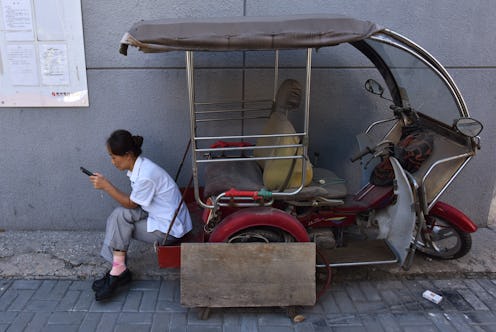Books
Could Smartphones Be The Answer To Illiteracy?
Say what you want about reading books on smartphones — and personally I'm not a fan — but for many people, smartphones are providing greater access to literature. A recent report from UNESCO suggests that smartphone proliferation might be fueling a "reading revolution" throughout the developing world, revealing that more people than ever are using their mobile devices to read. Which is really pretty awesome, and has the power to combat illiteracy worldwide.
The report is based on a survey of more than 4,000 people in Ethiopia, Ghana, India, Kenya, Nigeria, Pakistan and Zimbabwe, and reveals that not only are lots of people reading on mobile devices, but 62 percent also indicate that they are reading more thanks to their cell phones, and most mobile readers also say they enjoy reading more now that they can do it on their phones.
It might seem somewhat counter-intuitive that modern electronic devices have more reach in third-world countries than old fashioned paper books do, but when you consider the fact that a cell phone gives a person access to any book that's been released as an ebook (thousands of which are free), whereas a hard copy book gives you access to... one hard copy book, it makes a lot more sense. Plus, more people currently have access to a cell phone than have access to toilets. (Again, it makes more sense when you consider what is actually required to build a sanitation system).
UNESCO's report also found that mobile devices are particularly beneficial for women. It seems that though male mobile readers vastly outnumber female readers due to the fact that men are more likely to own or have access to a mobile device, the women and girls who do read on these devices actually read much, much more than men and boys. In other words, once women do gain access to mobile devices they become highly engaged readers, reading an average of 207 minutes per month — almost seven times as much as the average man, who reads only 33 minutes per month.
The report also suggests that mobile devices may help combat illiteracy in the developing world. Many participants were teachers who read to their students from a phone, and one in three participants who were parents say that they use their phones to read to their children. In other words, mobile phone access is increasing children's exposure to literature from a young age. And, it seems that it could do so even more if there were more books for children available – 34 percent of participants said they would read to their children if their device had more books for children available.
Plus, people in the survey reported that they had more positive feelings about reading now that they used a mobile device than they did previously — even if they previously disliked reading. Some even went from hating reading to become habitual readers, thanks to mobile devices. This sort of shift has the power to make reading more common in communities, thereby increasing the number of people with the ability to read, and sustaining reading ability throughout a person's life.
In a world where 774 million people are illiterate, it seems mobile devices have the power to make a big impact. Here's hoping this trend continues!
